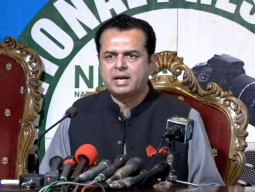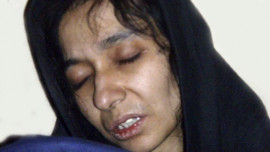
With only a few dozen lawmakers in the house, Pakistan Peoples Party (PPP) lawmaker Munawar Ali Talpur pointed out the quorum.
Deputy Speaker Javed Murtaza Abbasi then adjourned the session till next week. This is a second consecutive adjournment of the session on the bill owing to dismal participation of lawmakers. On Thursday, only 48 lawmakers attended the session, prompting the session to be adjourned.
A comprehensive legislation on the Cybercrime Bill has not been enacted for the last seven years. But the incumbent government has stepped up efforts to get a legislation passed on the subject in the months after December 16, 2014, attack on the school in Peshawar. However, the proposed legislation has faced opposition from certain lawmakers and the civil society, who believe the government is seeking to implement an increasingly restrictive online regime through the bill.
The last law relating to internet in the country was the Prevention of Cyber Crime Ordinance in 2007, promulgated by the then President General Pervez Musharraf. The ordinance failed to secure parliamentary approval and a fresh ordinance had to be promulgated in 2009. The second ordinance too failed to secure parliamentary approval.
The incumbent Pakistani Muslim League – Nawaz (PML-N) government then introduced a new cybercrime bill—Prevention of Electronic Crimes Bill 2015. Despite opposition, a parliamentary panel cleared the bill for debate on the floor of the assembly.
It is now propagated that this legislation has a direct link with the National Action Plan (NAP), which was devised following the Peshawar attack on December 16, 2014 that left over 130 children dead. This logic could not convince experts, opposition parties and members of the civil society because the government had already dropped key points from the counter terrorism strategy to take action against proscribed organisations.
Information technology experts believe that this legislation would not help the government curb activities of terrorists online, rather there was a danger that it could be abused by the authorities. Lawyer Yasir Latif Hamdani said that this legislation is permanent but the NAP must have some sunset clauses.
Farieha Aziz, Director of internet rights group Bolo Bhi, said that anyone can lodge a complaint with the Pakistan Telecommunication Authority (PTA) to block any website that is considered, even vaguely, a threat to national security.
“There are a number of vague clauses,” Aziz suggested.
“There is need to omit certain clauses from the current draft; these are sections 15, 16 (telecom offences), section 18 (dealt with under defamation law), section 22 (can be dealt with through spam filters, phone blocking tools and PTA directive for telecoms) and section 34 (blatant censorship and infringement of rights), she added.
“The government tabled this bill for discussion last month after the relevant standing committee had hurriedly approved this draft. The process of this bill was kept secret and the members of the steering committee which had prepared this bill were under oath to not share details of this draft with anyone,” a member of the committee told The Express Tribune.
During a heated debate on this bill last Monday over ‘Prevention of Electronic Crimes bill 2015’, the opposition parties proposed to form an ‘All Parties Group’ to revisit this in the parliamentary committee, while treasury benches insisted to debate in the house as it was made after thoughtful session on it.
Pakistan Peoples Party (PPP)’s Nafeesa Shah pointed out that fundamental rights might be compromised after passing this bill in such shape.
“It needs to thoroughly discussed once again by all parties,” she said.
Supporting her stance, Pakistan Tehreek-e-Insaf (PTI)’s parliamentarians Arif Alvi and Dr Shireen Mazari proposed that the bill must come under a threadbare discussion.
“A large number of faults are in this bill, so it should be discussed in the committee before bringing in the house for voting,” said Mazari.
Responding to the concerns raised from different parties, PML-N’s Capt (Retd) Muhammad Safdar claimed that the bill had been prepared after thorough discussion on it.
“Now, this bill should be brought to the house for discussion on it,” he said.
Wahajus Siraj, convener Internet Service Providers Association of Pakistan (ISPAK), said that through this bill, investigation agencies have been empowered to prepare forensic reports instead of proposing a separate but neutral body to conduct forensic reports.
“The body can work like a research institute,” he said.
Siraj told The Express Tribune, that the government has privately conveyed them to take back this bill for public hearing before voting in the lower house. The idea of a select committee was also under consideration, in which participation of all stakeholders would be ensured including the technicians.
Giving details of his interactions with the ruling party’s lawmakers including MNAs Maiza Hamid and Awais Ahmad Khan Laghari, Siraj said that PML-N members also wanted to debate on the proposed legislation.
“Awais Laghari has proposed to Captain (Retd) Muhammad Safdar to conduct a public hearing on this bill,” Wahaj said quoting the ruling party’s lawmaker.







1732355030-0/BeFunk_§_]__-(41)1732355030-0.jpg)


1732356840-0/Copy-of-Untitled-(1)1732356840-0-270x192.webp)






COMMENTS
Comments are moderated and generally will be posted if they are on-topic and not abusive.
For more information, please see our Comments FAQ